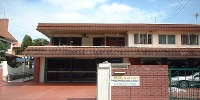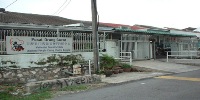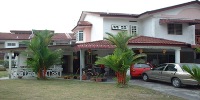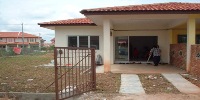WHENEVER Lee Pei Sun feels lonely, she takes a picture of her two sons from her wallet and looks at it. Divorced three years ago, Lee gets to see them once a week.
Lee, 28, suffers from Spinocerebellar Ataxia (SCA), a condition that progressively results in unsteady motion of the body. The disease began to attack her body after the birth of her first son, and now she moves about in a wheelchair and her speech is slurred.
Phua Gin Chu, 24, was one month away from getting her taekwondo black belt when she was admitted to hospital with excruciating back pain. Doctors could not determine the cause of her pain, which left her paralysed from waist down.
Krishnan Sivasankaran, 32, lost one leg in a motorcycle accident. The former security guard used to play in goal for a local football team.

COPING WITH CHANGES: Life is not the same anymore for (from left) Phua, Lim and Lee of The Beautiful Gate Foundation.
This is the world of the instant disabled, where a person loses his or her ability to perform routine tasks in one moment. Accepting that disability is not the easiest of tasks.
“I was very low on self esteem and confidence. Even when my friends came to visit, I would not see them. I preferred to cry alone in my room,” said Phua who lost her ability to walk when she was 16. Phua, who is from Sekinchan, was a prefect, played handball and was active in extra-curricular activities.
Depression set in and Phua slit her wrist. Fortunately, she was sent to the hospital in time.
“The doctor told me there were others who were worse off than me. I was told some of them still could draw with their mouth,” she recalled.
Phua, however, did not want to put herself into anyone else’s shoes. “I felt people’s love and support, but I couldn’t accept it. I didn’t want to be pitied,” she said.
After the divorce, Lee went to live at the Beautiful Gate Foundation in Petaling Jaya, a home for disabled people, at the recommendation of a friend. That was three years ago. Back then, any mention of her husband and two sons would set her crying. She also felt like ending her life.
“Although I felt dead inside, committing suicide was not an option because of my sons,” she said.
Lim Kee Loon, 24, was involved in a motorcycle accident in Kuala Lumpur that fractured his neck, ribs, hands and legs. His spinal cord was damaged as well and this affected everything from the chest down. He spent six months in the hospital before going back to his hometown of Kuantan, Pahang.
He occupied his time by watching television, going to hospital and surfing the Internet. He was able to type, although at a very slow pace.
While Lim was positive, his parents could not accept his disability.
“My mother cried every day. It was as if she had lost her son,” said Lim who was at that time two months away from completing his diploma in automotive engineering.
Lim could not bear to see his parents being stressed out and decided to go and live at Beautiful Gate.
“My parents were old anyway and I had to think of the future. I had to learn to be independent,” he said.
As can be seen from these life stories, it takes a while for the instant disabled to accept their condition. This has a lot to do with willpower and learning from others.
Phua’s life changed when she read a book by Taiwanese writer Xing Lin Zi who suffered from rheumatoid arthritis and had been confined to a wheelchair since she was 12.
“The book gave me confidence and inspiration. It was then that I realised life is important,” she said.
With encouragement from her headmaster and teachers, Phua went back to school. With time on her hands, Phua could concentrate on her studies and eventually scored a grade one in the SPM examinations.
She went on to get an advanced diploma in computing in a local college, whereas some of her peers dropped out. Phua also represented the country in table tennis at the 2002 Manchester and 2006 Melbourne Commonwealth Games.
“Some of my friends tell me that I encourage them. Life is a struggle till the end. We are learning all the time,” said Phua who heads the employment department at Beautiful Gate.
The ever-smiling Lee, meanwhile, has found a place to call home.
“I found God’s love here. I smile a lot because it brings warmth,” said Lee who reads a lot now.
Lim is doing a course in multimedia and hopes to be a programmer when he finishes.
Krishnan did that by turning to sports to occupy his time. He spent two depressed years at home before meeting disabled athlete Law King Khiew who taught him to exercise.
Krishnan took up powerlifting and finished fourth at the 2002 Busan Fespic Games with a personal best bench press of 90kg.
“Your body might be disabled, but your mind is not. Go out and meet other people. Don’t let it (mind) be disabled,” said Krishnan.
He also enrolled himself in an electronics course at the Rehabilitation and Industrial Training Centre (PLPP) in Bangi.
Krishnan now repairs wheelchairs for a living and he enjoys his work, which requires him to travel around the Klang Valley.
The International Day of Disabled Persons (IDD)
TODAY is International Day of Disabled Persons. Observed since 1990, this day promotes an understanding of disability issues and mobilises support for the dignity, rights and the well being of a disabled person. It also seeks to increase awareness of gains to be derived from the integration of persons with disabilities in every aspect of political, social, economic and cultural life.
Communities all over the world focus on measures to implement international norms and standards related to disabled persons.
This year’s theme for the IDD is “E-Accessibility”. Through its efforts, and collaboration with others, the United Nations aims to raise appreciation among Governments, private entities and the public of the significant benefits to disabled persons and societies when they are empowered with increased access to information technology.
Source:
http://www.un.org/
http://thestar.com.my/news/story.asp?file=/2006/12/3/focus/16204123&sec=focus






No comments:
Post a Comment